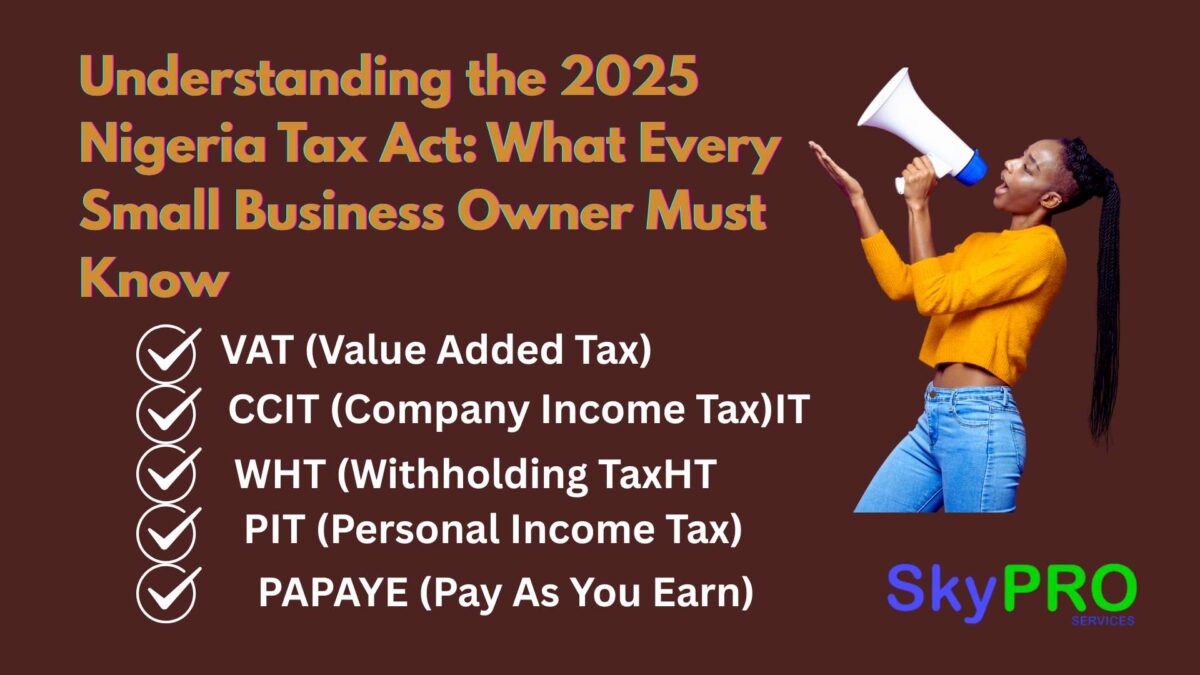
What Are the Legal Procedures to Set Up a Business in Nigeria?
November 3, 2025
Top 10 Tax Deductions and Reliefs Every Nigerian Business Should Claim in 2025
November 7, 2025Are you interested in understanding the 2025 Nigeria Tax Act? If yes, this guide is for you, as every small business owner must know about the Nigeria Tax Act 2025, small business tax law, company income tax updates, SME tax compliance in Nigeria, and FIRS tax reforms.
Overview of the New Nigeria Tax Act 2025
As Nigeria continues to strengthen its fiscal system, the 2025 Nigeria Tax Act has introduced sweeping reforms designed to modernize tax administration and promote small business growth. Understanding these updates is critical for every entrepreneur, startup founder, or SME owner who wants to stay compliant and avoid penalties.
This guide breaks down the key changes, reliefs, and practical compliance steps you should know under the new law.
You can check out a Guide to Tax Compliance for Small Businesses in Nigeria: Deadlines, Penalties, and Effective Management.
A Brief History of Tax Reforms in Nigeria
Over the past decade, Nigeria’s tax landscape has undergone a major transformation. From the Finance Acts of 2019–2023 to the TaxPro Max digital system, the government has consistently worked to improve transparency, expand the tax base, and simplify compliance for both individuals and corporations.
The 2025 Nigeria Tax Act builds upon these reforms — focusing on ease of doing business, digital compliance, and support for MSMEs (Micro, Small, and Medium Enterprises).
What are the Main Objectives of the New Tax Act
The Nigeria Tax Act 2025 was enacted to:
- Enhance revenue generation through efficient tax collection.
- Make tax compliance easier for small and medium-sized businesses (SMEs).
- Align Nigeria’s tax system with global digital economy standards.
- Reduce double taxation and improve incentives for job-creating sectors.
For small businesses, this means simpler filing, better access to tax reliefs, and clearer rules for income reporting.
What are the Key Changes Affecting Small Businesses
The 2025 Nigeria Tax Act introduces several important updates that directly impact how SMEs file and pay taxes. Below are the highlights every business owner should understand:
Corporate Income Tax (CIT) Adjustments
Under the new Act:
- Small companies (with annual turnover below ₦25 million) remain exempt from Company Income Tax (CIT).
- Medium-sized companies (₦25 million – ₦100 million turnover) now pay 17.5% CIT (up from 17%).
- Large companies (above ₦100 million turnover) are subject to 30% CIT, but can access new R&D and export-based tax credits.
- FIRS now allows electronic submission of audited accounts and CIT computations via TaxPro Max, eliminating paper filings.
This means digital compliance is no longer optional — it’s the new normal for all registered companies.
VAT and Withholding Tax Updates
The Value Added Tax (VAT) rate remains at 7.5%, but the 2025 Act introduced notable changes:
- Threshold exemption: Businesses with an annual turnover below ₦100 million are not required to charge or remit VAT.
- Input VAT credit: SMEs in manufacturing or tech services can now offset more input VAT against output VAT, improving cash flow.
- Withholding Tax (WHT) on contract payments has been streamlined to encourage early filing, with penalties increased for late remittance.
These updates make record-keeping and digital invoicing essential for small businesses.
PAYE and Personal Income Tax Modifications
The Personal Income Tax (PIT) framework under the 2025 Act has been adjusted to improve fairness and widen the taxpayer base:
- PAYE thresholds have been slightly revised to accommodate inflation.
- Freelancers and gig workers must now register for Tax Identification Numbers (TINs) and declare income digitally. Learn more about who is Eligible for TIN in Nigeria.
- States can now collaborate with FIRS through an integrated database to verify employee PAYE records.
For employers, this means ensuring staff payroll records are accurate, digitally filed, and up to date.
Discover How to Register for a Tax Identification Number in Nigeria — Step-by-Step Guide.
What are the Exemptions and Reliefs for SMEs
The 2025 Act provides strategic tax incentives to encourage entrepreneurship and innovation.
Startups and Turnover Thresholds
Newly registered startups enjoy up to three years of tax exemption if they:
- Have turnover below ₦25 million annually, and
- Operate within priority sectors like technology, agriculture, or renewable energy.
In addition, small companies can apply for reduced filing frequency — submitting annual returns once a year instead of quarterly.
Incentives for Digital and Manufacturing Sectors
To boost Nigeria’s competitiveness, the Act introduces:
- 5-year tax holidays for approved digital solution providers.
- Investment tax credits (up to 20%) for manufacturing companies investing in local production.
- Export rebate schemes for businesses earning foreign income.
These incentives are designed to reduce tax burdens while encouraging expansion and innovation.
How to Stay Compliant Under the 2025 Tax Act
Navigating the new tax environment can be overwhelming — but compliance is simpler when you follow the right steps.
1. Use Digital Filing Tools (TaxPro Max)
The FIRS TaxPro Max portal is now the official platform for:
- Filing returns (CIT, VAT, WHT, PAYE)
- Paying taxes securely online
- Generating Tax Clearance Certificates (TCC).
Learn more about how to Process Tax Clearance for a New Company in Nigeria.
Every business should register and file through TaxPro Max to avoid delays or penalties.
2. Hire Professional Tax Consultants
Even with automation, tax compliance can still be complex — especially when dealing with exemptions, audits, and multi-state filings.
That’s where SkyPro Professional Services comes in. Their team of tax experts helps businesses:
- Interpret the 2025 Tax Act correctly
- File accurate returns
- Plan strategically to reduce tax liabilities
Expert Insight – SkyPro’s Compliance Support
At SkyPro Professional Services, we understand how critical compliance is to your business success.
Our experts offer:
- Simplified compliance strategies tailored to your business size.
- Tax planning and advisory services to minimize long-term tax exposure.
- Audit support and digital filing assistance to keep your records in order.
With our professional guidance, you’ll never have to worry about missing tax deadlines or facing penalties.
Conclusion: Understanding the 2025 Nigeria Tax Act: What Every Small Business Owner Must Know
The Nigeria Tax Act 2025 marks a major shift in the country’s tax landscape — emphasizing digitalization, SME support, and accountability.
For small business owners, this is the best time to understand your obligations, take advantage of reliefs, and strengthen your compliance strategy.
Confused about how the 2025 Tax Act affects your business?
Let SkyPro’s tax experts simplify it for you.
Email: info@skyproservices.com.ng




